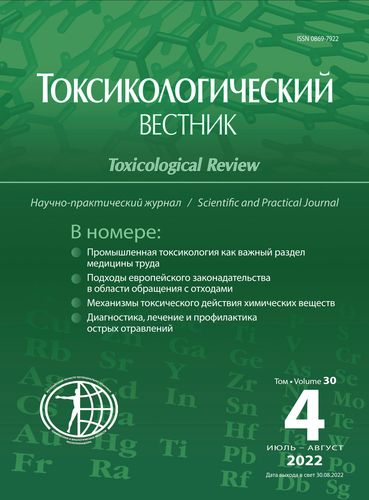Histological and ultrastructural changes in rat kidneys in the early period after paraoxone poisoning
- Authors: Sokolova M.O.1,2, Sobolev V.E.1, Goncharov N.V.1
-
Affiliations:
- I.M. Sechenov Institute of Evolutionary Physiology and Biochemistry of the Russian Academy of Sciences
- The named after S.M. Kirov Military Medical Academy of the Ministry of Defense of the Russian Federation
- Issue: No 4 (2022)
- Pages: 231-237
- Section: Original articles
- Published: 01.09.2022
- URL: https://rjsocmed.com/0869-7922/article/view/641440
- DOI: https://doi.org/10.47470/0869-7922-2022-30-4-231-237
- ID: 641440
Cite item
Full Text
Abstract
Introduction. Toxic nephropathies are not limited to a single morphological type of kidney tissue damage. The widespread distribution of organophosphorus compounds (OPs) in the modern world makes it necessary to study the morphological manifestations and delayed effects of OPs on various organs and tissues of the human and animal body.
Material and methods. The article presents the results of a study of changes in the kidneys of rats at the ultrastructural level in the early stages after a single injection of paraoxon at doses of LD50 and LD84.
Results. It has been shown that after the introduction of paraoxon, the epithelial cells of the convoluted tubules are initially damaged, and a week after the poisoning, changes are recorded in the renal corpuscle, manifested in an increase in the thickness of the glomerular basement membrane.
Limitations. Morphological changes in the renal tissues were analyzed in a single poisoning at doses of LD50 and LD84.
Conclusion. The changes detected in the renal corpuscles indicate the feasibility of further studies on the effect of FOS on the nature, sequence and mechanism of nephrotoxic effects of FOS in models of acute and chronic intoxication.
Compliance with ethical standards. The experimental study was approved by the local ethical committee of the I.M. Sechenov Institute of Evolutionary Physiology and Biochemistry of the Russian Academy of Sciences.
Contribution of the authors:
Sokolova M.O. — collecting and processing of the material, statistical analysis, writing a text.
Sobolev V.E. — the concept and design of the study, collecting and processing of the material, editing.
Goncharov N.V. — the concept and design of the study, collecting and processing of the material, editing.
All co-authors — approval of the final version of the article, responsibility for the integrity of all parts of the article.
Conflict of interests. The authors declare no conflict of interests.
Acknowledgments. The work was carried out with the support of the state program АААА-А18-118012290142-9.
Received: September 13, 2021 / Accepted: July 21, 2022 / Published: August 30, 2022
About the authors
Margarita Olegovna Sokolova
I.M. Sechenov Institute of Evolutionary Physiology and Biochemistry of the Russian Academy of Sciences; The named after S.M. Kirov Military Medical Academy of the Ministry of Defense of the Russian Federation
Author for correspondence.
Email: sokolova.rita@gmail.com
Junior Researcher of the Research Center of the named after S.M. Kirov Military Medical Academy of the Ministry of Defense of the Russian Federation, Saint-Petersburg, 194044, Russian Federation.
e-mail: sokolova.rita@gmail.com
Russian FederationVladislav Evgenevich Sobolev
I.M. Sechenov Institute of Evolutionary Physiology and Biochemistry of the Russian Academy of Sciences
Email: vesob@mail.ru
ORCID iD: 0000-0001-7775-8205
Russian Federation
Nikolai Vasilevich Goncharov
I.M. Sechenov Institute of Evolutionary Physiology and Biochemistry of the Russian Academy of Sciences
Email: ngoncharov@gmail.com
ORCID iD: 0000-0002-5452-2125
Russian Federation
References
- Satar S., Satar D.A., Mete U.O., Suchard J., Topal M., Kaya M. Ultrastructural effects of acute organophosphate poisoning on rat kidney. Renal Failure. 2005; 27: 623–7.
- Valcke M., Levasseur M.-E., Silva A.S., Wesseling C. Pesticide exposures and chronic kidney disease of unknown etiology: an epidemiologic review. Environmental Health. 2017; 16(49): 1–20.
- Cavari Y., Landau D., Sofer S., Leibson T., Lazar I. Organophosphate Poisoning-Induced Acute Renal Failure. Pediatric emergency care. 2013; 29: 646–7.
- Kaya Y., Bas O., Hanci H., Cankaya S., Nalbant I., Odaci E. et al. Acute renal involvement in organophosphate poisoning: histological and immunochemical investigations. Renal Failure. 2018; 40: 410–5.
- Marshall C.B. Rethinking glomerular basement membrane thickening in diabetic nephropathy: adaptive or pathogenic? Physiol. Renal Physiol. 2016; 311(5): 831-43.
- Gu X., Zhang S., Zhang T. Abnormal Crosstalk between Endothelial Cells and Podocytes Mediates Tyrosine Kinase Inhibitor (TKI)-Induced Nephrotoxicity. Cells. 2021; 10(869): 1–20.
- Yokota K., Fukuda M., Katafuchi R., Okamoto T. Nephrotic syndrome and acute kidney injury induced by malathion toxicity. BMJ Case Rep. 2017; 9: bcr2017220733.
- Sobolev V.E., Korf E.A., Goncharov N.V. Rat (Rattus Norvegicus) as an Object of Research in the Model of Acute Poisoning with Organophospates. Morphofunctional Changes of Kidneys. Zhurnal evolyucionnoj biohimii i fiziologii. 2019; 55(4): 272–81. (in Russian)
- Thomas B., Batuman V. What is the role of the glomerular basement membrane (GBM) in the pathophysiology of proteinuria? (2020) Available at: https://www.medscape.com/answers/238158-93493 (accessed 5 March 2020).
- Scott R.P., Quaggin S.E. Formation and Maintenance of a Functional Glomerulus. In: Kidney development disease repair and regeneration. Amsterdam: 2016; 103–19.
- Kryukov E.V., Dacko A.V., Potekhin N.P., Sarkisov K.A., Borisov A.G., Petrova O.N., Koryakin S.V. Chronic kidney disease as a factor affecting the determination of the category of fitness for military service. Voenno-medicinskij zhurnal. 2021; 342(3): 31–7. (in Russian)
Supplementary files









